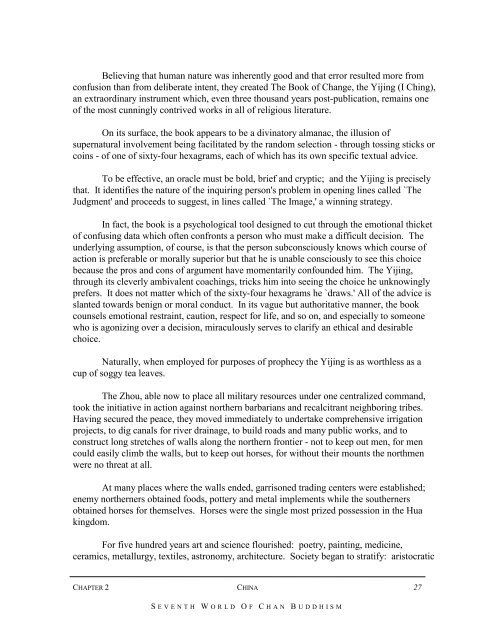seventh world of chan buddhism - Zen Buddhist Order of Hsu Yun
seventh world of chan buddhism - Zen Buddhist Order of Hsu Yun
seventh world of chan buddhism - Zen Buddhist Order of Hsu Yun
You also want an ePaper? Increase the reach of your titles
YUMPU automatically turns print PDFs into web optimized ePapers that Google loves.
Believing that human nature was inherently good and that error resulted more from<br />
confusion than from deliberate intent, they created The Book <strong>of</strong> Change, the Yijing (I Ching),<br />
an extraordinary instrument which, even three thousand years post-publication, remains one<br />
<strong>of</strong> the most cunningly contrived works in all <strong>of</strong> religious literature.<br />
On its surface, the book appears to be a divinatory almanac, the illusion <strong>of</strong><br />
supernatural involvement being facilitated by the random selection - through tossing sticks or<br />
coins - <strong>of</strong> one <strong>of</strong> sixty-four hexagrams, each <strong>of</strong> which has its own specific textual advice.<br />
To be effective, an oracle must be bold, brief and cryptic; and the Yijing is precisely<br />
that. It identifies the nature <strong>of</strong> the inquiring person's problem in opening lines called `The<br />
Judgment' and proceeds to suggest, in lines called `The Image,' a winning strategy.<br />
In fact, the book is a psychological tool designed to cut through the emotional thicket<br />
<strong>of</strong> confusing data which <strong>of</strong>ten confronts a person who must make a difficult decision. The<br />
underlying assumption, <strong>of</strong> course, is that the person subconsciously knows which course <strong>of</strong><br />
action is preferable or morally superior but that he is unable consciously to see this choice<br />
because the pros and cons <strong>of</strong> argument have momentarily confounded him. The Yijing,<br />
through its cleverly ambivalent coachings, tricks him into seeing the choice he unknowingly<br />
prefers. It does not matter which <strong>of</strong> the sixty-four hexagrams he `draws.' All <strong>of</strong> the advice is<br />
slanted towards benign or moral conduct. In its vague but authoritative manner, the book<br />
counsels emotional restraint, caution, respect for life, and so on, and especially to someone<br />
who is agonizing over a decision, miraculously serves to clarify an ethical and desirable<br />
choice.<br />
Naturally, when employed for purposes <strong>of</strong> prophecy the Yijing is as worthless as a<br />
cup <strong>of</strong> soggy tea leaves.<br />
The Zhou, able now to place all military resources under one centralized command,<br />
took the initiative in action against northern barbarians and recalcitrant neighboring tribes.<br />
Having secured the peace, they moved immediately to undertake comprehensive irrigation<br />
projects, to dig canals for river drainage, to build roads and many public works, and to<br />
construct long stretches <strong>of</strong> walls along the northern frontier - not to keep out men, for men<br />
could easily climb the walls, but to keep out horses, for without their mounts the northmen<br />
were no threat at all.<br />
At many places where the walls ended, garrisoned trading centers were established;<br />
enemy northerners obtained foods, pottery and metal implements while the southerners<br />
obtained horses for themselves. Horses were the single most prized possession in the Hua<br />
kingdom.<br />
For five hundred years art and science flourished: poetry, painting, medicine,<br />
ceramics, metallurgy, textiles, astronomy, architecture. Society began to stratify: aristocratic<br />
CHAPTER 2 CHINA<br />
S EVENTH W ORLD O F C HAN B UDDHISM<br />
27


